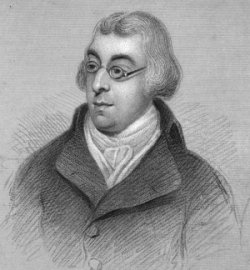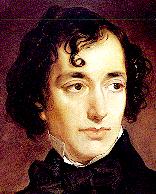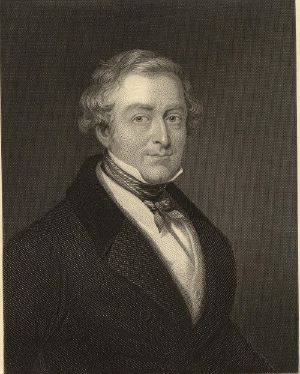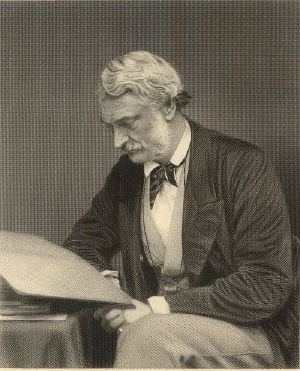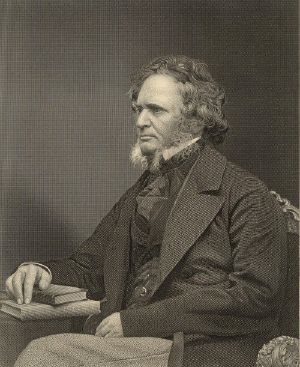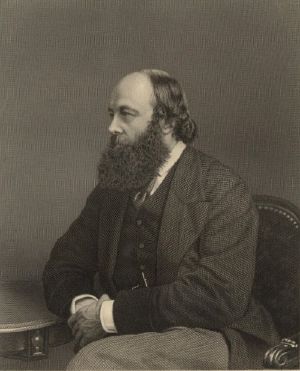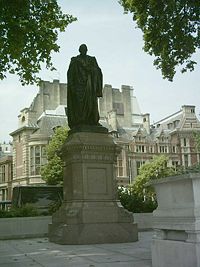Difference between revisions of "Benjamin Disraeli" - New World Encyclopedia
| Line 160: | Line 160: | ||
* [[Robert Blake, Baron Blake|Blake, Robert]]. ''Disraeli''. London: Oxford U.P., 1969 ISBN 0198329032 | * [[Robert Blake, Baron Blake|Blake, Robert]]. ''Disraeli''. London: Oxford U.P., 1969 ISBN 0198329032 | ||
| − | * Conancher, J. B. "Peel and the Peelites, 1846-1850." ''The English Historical Review''. Vol. 73, No. 288 (Jul., 1958), 431-452.? | + | * Conancher, J. B. "Peel and the Peelites, 1846-1850." ''The English Historical Review''. Vol. 73, No. 288 (Jul., 1958), pp.431-452.? |
| − | * [[Norman Gash|Gash, Norman]]. Review of ''Disraeli'', by Robert Blake. ''The English Historical Review'', Vol. 83, No. 327. (Apr., 1968), 360-364 ? | + | * [[Norman Gash|Gash, Norman]]. Review of ''Disraeli'', by Robert Blake. ''The English Historical Review'', Vol. 83, No. 327. (Apr., 1968), pp.360-364 ? |
| − | * Ghosh, P. R. "Disraelian Conservatism: A Financial Approach." ''The English Historical Review.'' Vol. 99, No. 391 (Apr., 1984), 268-296. ? | + | * Ghosh, P. R. "Disraelian Conservatism: A Financial Approach." ''The English Historical Review.'' Vol. 99, No. 391 (Apr., 1984), pp.268-296. ? |
| − | * Graubard, Stephen R. Review of ''Disraeli'', by Robert Blake. ''The American Historical Review'', Vol. 73, No. 1. (Oct., 1967), 139. ? | + | * Graubard, Stephen R. Review of ''Disraeli'', by Robert Blake. ''The American Historical Review'', Vol. 73, No. 1. (Oct., 1967), p.139. ? |
* Jerman, B. R. ''The Young Disraeli''. Princeton, N.J.: Princeton University Press, 1960. | * Jerman, B. R. ''The Young Disraeli''. Princeton, N.J.: Princeton University Press, 1960. | ||
| Line 176: | Line 176: | ||
* [[G.M. Trevelyan|Trevelyan, George Macaulay]] ''The Life of John Bright''. London: Routledge/Thoemmes Press ; Tokyo : Kinokuniya Co., 1993. | * [[G.M. Trevelyan|Trevelyan, George Macaulay]] ''The Life of John Bright''. London: Routledge/Thoemmes Press ; Tokyo : Kinokuniya Co., 1993. | ||
| − | * [[Claudio Veliz|Veliz, Claudio]]. "Egana, Lambert, and the Chilean Mining Associations of 1825." ''The Hispanic American Historical Review ''. Vol. 55, No. 4 (Nov., 1975), 637-663. ? | + | * [[Claudio Veliz|Veliz, Claudio]]. "Egana, Lambert, and the Chilean Mining Associations of 1825." ''The Hispanic American Historical Review ''. Vol. 55, No. 4 (Nov., 1975), pp.637-663. ? |
==See also== | ==See also== | ||
Revision as of 00:08, 18 July 2006
| The Rt Hon. Benjamin Disraeli | |
| Benjamin Disraeli
| |
| In office February – December, 1868 February, 1874 – April, 1880 | |
| Preceded by | The Earl of Derby William Ewart Gladstone |
|---|---|
| Succeeded by | William Ewart Gladstone |
Chancellor of the Exchequer
| |
| In office February 27, 1852 – December 17, 1852 February 26, 1858 – June 11, 1859 July 6, 1866 – February 29, 1868 | |
| Preceded by | Charles Wood George Cornewall Lewis William Ewart Gladstone |
| Succeeded by | William Ewart Gladstone William Ewart Gladstone George Ward Hunt |
| Born | 21 December 1804 London |
| Died | 19 April 1881 London |
| Political party | Conservative |
Benjamin Disraeli, 1st Earl of Beaconsfield, KG, PC, FRS (21 December, 1804 – 19 April, 1881) was an English statesman and literary figure. He served in government for three decades, twice as Prime Minister of the United Kingdom – the first and thus far only person of Jewish parentage to do so, although Disraeli was baptised in the Anglican Church at an early age. Disraeli's most lasting achievement was the creation of the modern Conservative Party after the Corn Laws schism of 1846.
Although a major figure in the protectionist wing of the Conservative Party after 1846, Disraeli's relations with the other leading figures in the party, particularly Lord Derby, the overall leader, were often strained. Not until the 1860s would Derby and Disraeli be on easy terms, and the latter's succession of the former assured. From 1852 onwards Disraeli's career would also be marked by his often intense rivalry with William Ewart Gladstone, who eventually rose to become leader of the Liberal Party. In this duel, Disraeli was aided by his warm friendship with Queen Victoria, who came to detest Gladstone during the latter's first premiership in the 1870s. In 1876 Disraeli was raised to the peerage as the Earl of Beaconsfield, capping nearly four decades in the House of Commons. He died in 1881.
Before and during his political career Disraeli was well-known as a literary and social figure, although his novels are not generally regarded as belonging to the first rank of Victorian literature. He mainly wrote romances, of which Sybil and Vivian Grey are perhaps the best-known today. He was and is unusual among British Prime Ministers for having gained equal social and political renown.
Early life
Disraeli descended from Italian Sephardic Jews from both his maternal and paternal sides, although he claimed Spanish ancestry during his own lifetime, he may have just been referring to the fact that all Sephardim ultimately originate in Spain. [1] His father was the literary critic and historian Isaac D'Israeli who, though Jewish, in 1817 had Benjamin baptised in the Church of England, following a dispute with their synagogue. The elder D'Israeli (Benjamin changed the spelling in the 1820s by dropping the foreign-looking apostrophe) himself was content to remain outside organized religion. [2] Benjamin at first attended a small school in Blackheath called Eliot Place (later to evolve into St Piran's School). Beginning in 1817 Benjamin attended Higham Hall, in Walthamstow. His younger brothers, in contrast, attended the superior Winchester College, a fact which apparently grated on Disraeli and may explain his dislike of his mother, Maria D'Israeli.
His father destined him for the law, and he was articled to a solicitor in 1821. The law was, however, uncongenial, and by 1825 he gave it up. Disraeli was apparently determined to obtain independent means, and speculated on the stock exchange as early as 1824 on various South American mining companies. The recognition of the new South American republics on the recommendation of George Canning had led to a considerable boom, encouraged by various promoters and aggrandizers. In this connection Disraeli became involved with the financier J. D. Powles, one such booster. In the course of 1825 Disraeli wrote three anonymous pamphlets for Powles, promoting the companies. [3]
That same year Disraeli's financial activities brought him into contact with the publisher John Murray. Murray, like Powles and Disraeli, was involved in the South American mines. Accordingly, they attempted to bring out a newspaper, The Representative, to promote the cause of the mines and those politicians who supported the mines, specifically Canning. The paper was a failure, in part because the mining "bubble" burst in late 1825, ruining Powles and Disraeli. Also, according to Disraeli's biographer, Lord Blake, the paper was "atrociously edited", and would have failed anyway. The debts which Disraeli incurred through this affair would dog him the rest of his life.
Literary career
Disraeli now turned towards literature, and brought out his first novel, Vivian Grey, in 1827. Disraeli's biographers agree that Vivian Grey was a thinly-veiled re-telling of the affair of the Representative, and it proved very popular on its release, although it also caused much offence within the Tory literary world when Disraeli's authorship was discovered. The book, which was initially published anonymously, was purportedly written by a "man of fashion" – someone who moved in high society. Disraeli, then just twenty-three, did not move in high society, and the numerous solecisms present in Vivian Grey made this painfully obvious. Reviewers were sharply critical on these grounds of both the author and the book. Furthermore, Murray believed that Disraeli had caricatured him and abused his confidence–an accusation denied at the time, and by the official biography, although subsequent biographers (notably Blake) have sided with Murray.[4]
After producing a Vindication of the British Constitution, and some political pamphlets, Disraeli followed up Vivian Grey by a series of novels, The Young Duke (1831), Contarini Fleming (1832), Alroy (1833), Venetia and Henrietta Temple (1837). During the same period he had also written The Revolutionary Epick and three burlesques, Ixion, The Infernal Marriage, and Popanilla. Of these only Henrietta Temple (based on his affair with Henrietta Sykes) was a true success.
Parliament
Disraeli had been considering a political career as early as 1830, before he departed England for the Mediterranean. His first real efforts, however, did not come until 1832, during the great crisis over the Reform Bill, when he contributed to an anti-Whig pamphlet edited by Croker and published by Murray entitled England and France: or a cure for Ministerial Gallomania. The choice of a Tory publication was regarded as odd if not offensive by Disraeli's friends and relatives, who thought him more of a Radical.
Indeed, Disraeli had objected to Murray about Croker inserting "high Tory" sentiment, writing that "it is quite impossible that anything adverse to the general measure of Reform can issue from my pen." Further, at the time Gallomania was published, Disraeli was in fact electioneering in High Wycombe in the Radical interest. [5] Disraeli's politics at the time were influenced both by his rebellious streak and by his desire to make his mark. In the early 1830s the Tories and the interests they represented appeared to be a lost cause. The other great party, the Whigs, was apparently anathema to Disraeli: "Toryism is worn out & I cannot condescend to be a Whig." [6]
Though he initially stood for election, unsuccessfully, as a Radical, Disraeli was a progressive Tory by the time he won a seat in the House of Commons in 1837 representing the constituency of Maidstone. The next year he settled his private life by marrying Mary Anne Lewis, the widow of Wyndham Lewis, Disraeli's erstwhile colleague at Maidstone.
Although nominally a Conservative, Disraeli was sympathetic to some of the demands of the Chartists and argued for an alliance between the landed aristocracy and the working class against the increasing power of the middle class, helping to found the Young England group in 1842 to promote the view that the rich should use their power to protect the poor from exploitation by the middle class. During the twenty years which separated the Corn Laws and the Second Reform Bill Disraeli would seek Tory-Radical alliances, to little avail.
Prime Minister Sir Robert Peel passed over Disraeli when putting together his government in 1841 and Disraeli, hurt, gradually became a sharp critic of Peel's government, often deliberately adopting positions contrary to those of his nominal chief. The best known of these cases was the Maynooth grant in 1845 and the repeal of the Corn Laws in 1846. The end of 1845 and the first months of 1846 were dominated by the battle in parliament between the free traders and the protectionists over the repeal of the Corn Laws, with the latter rallying around Disraeli and Lord George Bentinck. An alliance of pro-Peel Conservatives, Radicals, and Whigs carried repeal, but the Conservative Party split in half. Peel and his followers, known as Peelites, moved towards the Whigs, while a new Conservative Party formed around the protectionists, led by Disraeli, Bentinck, and Lord Stanley (later Lord Derby).
Office
The First Derby government
The first opportunity for Disraeli, Stanley, and the protectionist Tories to take office had come in 1851, when Lord John Russell's government had been defeated in the House of Commons over the Ecclesiastical Titles Act 1851. Disraeli was to have been Home Secretary, with Stanley (who became the Earl of Derby later that year) as Prime Minister. The Peelites, however, refused to serve under Stanley or with Disraeli, and attempts to create a purely protectionist government failed. [7]
Russell resumed office, but resigned again in early 1852 when a combination of the protectionists and Lord Palmerston defeated him on a Militia Bill. This time Lord Derby (as he had become) took office, and appointed Disraeli Chancellor of the Exchequer and Leader of the House of Commons. Disraeli's first and primary responsibility was to produce a Budget for the coming fiscal year. He proposed to reduce taxes on Malt and Tea (indirect taxation); additional revenue would come from an increase in the House tax. More controversially, Disraeli also proposed to alter the workings of the Income Tax (direct taxation) by "differentiating"–i.e., different rates would be levied on different types of income. [8] The establishment of the income tax on a permanent basis had been the subject of much inter-party discussion since the fall of Peel's ministry, but no conclusions had been reached, and Disraeli was criticised for mixing up details over the different "schedules" of income. He was also hampered by an unexpected increase in defence expenditure, which was forced on him by Derby and Sir John Pakington (leading to his celebrated remark to John Bright about the "damned defences"). [9] This, combined with bad timing and perceived inexperience led to the failure of the Budget and consequently the fall of the government in December of that year.
Nonetheless, William Ewart Gladstone's final speech on the Budget marked the beginning of over twenty years of mutual parliamentary hostility and the end of Gladstone's formal association with the Conservative Party.
The Second & Third Derby governments
In 1858, Derby returned to the office of the Prime Minister and again appointed Disraeli his Chancellor of the Exchequer and government leader of the House of Commons (as the Prime Minister sat in the House of Lords) with responsibilities to introduce reforms to parliament but his reforms would have disenfranchised some voters in the towns and were opposed by the Liberals and defeated. The ministry fell in 1859 and Disraeli returned to the opposition bench until 1866 when he again became Chancellor of the Exchequer and government leader in the House of Commons.
After engineering the defeat of a Liberal Reform Bill introduced by Gladstone in 1866, Disraeli and Derby introduced their own measure in 1867.
This was primarily a political strategy designed to give Conservatives control of the reform process and thereby long term benefits in the Commons, similar to those derived by the Whigs after the 1832 Reform Act. The Reform Act of 1867 extended the franchise by 1,500,000 by giving the vote to male householders and male lodgers paying at least 10 pounds for rooms and eliminating rotten boroughs with fewer than 10,000 inhabitants and granting constituencies to fifteen unrepresented towns and extra representation in parliament to larger towns such as Liverpool and Manchester, which had previously been underrepresented in Parliament. This act was unpopular with the right wing of the Conservative Party, most notably Lord Cranborne (later the Marquess of Salisbury), who resigned from the government and spoke against the bill. Cranborne, however, was unable to lead a rebellion similar to that which Disraeli had led against Peel twenty years earlier.
Disraeli's involvement in the passing of the Second Reform Act 1867 is largely seen as a cyncial example of political opportunism. [10]
Prime Minister
First government
Derby's health had been declining for some time and he finally resigned as Prime Minister in late February of 1868; he would live for another twenty months. Disraeli's efforts over the past two years had dispelled, for the time being, any doubts about him succeeding Derby as leader of the Conservative Party and therefore Prime Minister. As Disraeli remarked, "I have climbed to the top of the greasy pole." [11]
However, the Conservatives were still a minority in the House of Commons, and the enaction of the Reform Bill required the calling of new election once the new voting register had been compiled. Disraeli's term as Prime Minister would therefore be fairly short, unless the Conservatives won the general election. He made only two major changes in the cabinet: he replaced Lord Chelmsford as Lord Chancellor with Lord Cairns, and brought in George Ward Hunt as Chancellor of the Exchequer. Disraeli and Chelmsford had never gotten along particularly well, and Cairns, in Disraeli's view, was a far stronger minister. [12]
Disraeli's first premiership was dominated by the heated debate over the established Church of Ireland. Although Ireland was (and remains) overwhelmingly Roman Catholic, the Protestant Church remained the established church and was funded by direct taxation. An initial attempt by Disraeli to negotiate with Cardinal Manning the establishment of a Roman Catholic university in Dublin foundered in mid-March when Gladstone moved resolutions to dis-establish the Irish Church altogether. The proposal divided the Conservative Party while reuniting the Liberals under Gladstone's leadership. While Disraeli's government survived until the December general election, the initiative had passed to the Liberals.[13]
Second government
However, in the election that followed, William Gladstone and the Liberals were returned to power with a majority of 170. After six years in opposition, Disraeli and the Conservative Party won the election giving the party its first absolute majority in the House of Commons since the 1840s. Disraeli's government introduced various reforms such as the Artisans Dwellings Act (1875), the Public Health Act (1875), the Pure Food and Drugs Act (1875), the Climbing Boys Act (1875), the Education Act (1876). His government also introduced a new Factory Act meant to protect workers, the Conspiracy and Protection of Property Act (1875) to allow peaceful picketing and the Employers and Workmen Act (1878) to enable workers to sue employers in the civil courts if they broke legal contracts.
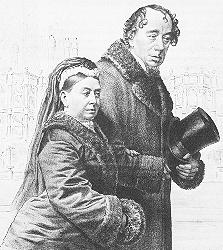
Disraeli was a staunch British imperialist and helped strengthen the British Empire with his support for the construction of the Suez Canal. He also achieved a diplomatic success at the Congress of Berlin in 1878 in limiting the growing influence of Russia in the Balkans and breaking up the League of the Three Emperors. However, difficulties in South Africa, epitomised by the defeat of the British Army at the Battle of Isandlwana, and Afghanistan weakened his government and likely led to his party's defeat in the 1880 election.
He was elevated to the House of Lords in 1876 when Queen Victoria (who liked Disraeli both personally and politically) made him Earl of Beaconsfield and Viscount Hughenden. He remained Prime Minister until 1880 when the Conservatives were defeated by William Gladstone's Liberals in that year's general election. Disraeli became ill soon after and died in April 1881. His literary executor and for all intents and purposes his heir was his private secretary, Lord Rowton.
Disraeli's governments
- First Disraeli Ministry (February–December 1868)
- Second Disraeli Ministry (February 1874–April 1880)
Works by Disraeli
Fiction
- Vivian Grey (1826; Vivian Grey, available for free via Project Gutenberg)
- Popanilla (1828; Popanilla, available for free via Project Gutenberg)
- The Young Duke (1831)
- Contarini Fleming (1832)
- Alroy (1833)
- The Infernal Marriage (1834)
- Ixion in Heaven (1834)
- The Revolutionary Epick (1834)
- The Rise of Iskander (1834; The Rise of Iskander, available for free via Project Gutenberg)
- Henrietta Temple (1837)
- Venetia (1837; Venetia, available for free via Project Gutenberg)
- The Tragedy of Count Alarcos (1839); The Tragedy of Count Alarcos, available for free via Project Gutenberg)
- Coningsby, or the New Generation (1844; Coningsby, available for free via Project Gutenberg)
- Sybil, or The Two Nations (1845; Sybil or, The Two Nations, available for free via Project Gutenberg)
- Tancred, or the New Crusade (1847)
- Lothair (1870; Lothair, available for free via Project Gutenberg)
- Endymion (1880; Endymion, available for free via Project Gutenberg)
- Falconet (book) (unfinished 1881)
Non-fiction
- An Inquiry into the Plans, Progress, and Policy of the American Mining Companies (1825)
- Lawyers and Legislators: or, Notes, on the American Mining Companies (1825)
- The present state of Mexico (1825)
- England and France, or a Cure for the Ministerial Gallomania (1832)
- What Is He? (1833)
- The Letters of Runnymede (1836)
- Lord George Bentinck (1852)
Biographies of Disraeli
- Blake, Robert, Disraeli. London: Oxford U.P., 1969 ISBN 0198329032
- Bradford, Sarah. Disraeli. New York : Stein and Day, 1983, c1982 ISBN 0812828992
- Hibbert, Christopher. Disraeli and His World. London : Thames and Hudson, 1978 ISBN 0500130655
- Hibbert, Christopher. Disraeli, a Personal History. London : HarperCollins Publishers, 2004 ISBN 0007147171
- Maurois, André, Disraeli. London, 1927.
- Monypenny, William and Buckle, George, The Life of Benjamin Disraeli, Earl of Beaconsfield. New York, Russell & Russell 1968.
- Pearson, Hesketh, Dizzy: a life of Benjamin Disreali . London : Penguin, 2001 ISBN 0141390891
- Ridley, Jane. Young Disraeli, 1804-1846. New York : Crown Publishers, c1995 ISBN 0517586436
- Smith, Paul. Disraeli: A Brief Life. Cambridge ; New York, NY, USA : Cambridge University Press, 1996 ISBN 0521381509
- Weintraub, Stanley. Disraeli. New York : Truman Talley Books/Dutton, 1993 ISBN 0525936688
Films featuring Disraeli
- Disraeli (1929 in film|1929) George Arliss (Best Actor Oscar), Joan Bennett
- The Prime Minister (1941 in film|1941) John Gielgud
- The Mudlark (1950 in film|1950) Alec Guinness
- Disraeli (1978 in film|1978) Ian McShane, Mary Peach (Masterpiece Theatre four-part series)
- Mrs. Brown (1997 in film|1997) Sir Antony Sher
Notes
- ↑ Robert Blake, Disraeli, 3. Norman Gash, reviewing Blake's work, argued that Benjamin's claim to Spanish ancestry could not be entirely dismissed. Norman Gash, review of Disraeli, by Robert Blake. The English Historical Review, Vol. 83, No. 327. (Apr., 1968), 360-364
- ↑ Opponents, however, continued to include the apostrophe in correspondence. Lord Lincoln, writing to Sir Robert Peel in 1846, referred to "D'Israeli." J. B. Conacher, "Peel and the Peelites, 1846-1850." The English Historical Review, Vol. 73, No. 288. (Jul., 1958), 435
- ↑ Blake, Disraeli, 24-26; Claudio Veliz, "Egana, Lambert, and the Chilean Mining Associations of 1825." The Hispanic American Historical Review, Vol. 55, No. 4. (Nov., 1975), 637-663
- ↑ Stephen R. Graubard, review of Disraeli, by Robert Blake. The American Historical Review, Vol. 73, No. 1. (Oct., 1967), 139.
- ↑ Robert Blake, Disraeli, (New York, 1966), 84-86.
- ↑ Ibid, 87
- ↑ Ibid, 301-305.
- ↑ P. R. Ghosh, "Disraelian Conservatism: A Financial Approach." The English Historical Review, Vol. 99, No. 391. (Apr., 1984), 269-273; H. C. G. Matthew, "Disraeli, Gladstone, and the Politics of Mid-Victorian Budgets." The Historical Journal, Vol. 22, No. 3. (Sep., 1979), 621.
- ↑ Bright's diary quotes the conversation in full. See George Trevelyan, The Life of John Bright, (London, 1913), 205-206
- ↑ Sean Lang, Parliamentary Reform, 1785-1928, (Routledge, 1999), passim.
- ↑ Blake, Disraeli, 485-487.
- ↑ Ibid, 487-489.
- ↑ Ibid, 496-502.
ReferencesISBN links support NWE through referral fees
- Blake, Robert. Disraeli. London: Oxford U.P., 1969 ISBN 0198329032
- Conancher, J. B. "Peel and the Peelites, 1846-1850." The English Historical Review. Vol. 73, No. 288 (Jul., 1958), pp.431-452.?
- Gash, Norman. Review of Disraeli, by Robert Blake. The English Historical Review, Vol. 83, No. 327. (Apr., 1968), pp.360-364 ?
- Ghosh, P. R. "Disraelian Conservatism: A Financial Approach." The English Historical Review. Vol. 99, No. 391 (Apr., 1984), pp.268-296. ?
- Graubard, Stephen R. Review of Disraeli, by Robert Blake. The American Historical Review, Vol. 73, No. 1. (Oct., 1967), p.139. ?
- Jerman, B. R. The Young Disraeli. Princeton, N.J.: Princeton University Press, 1960.
- Lang, Sean. Parliamentary Reform, 1785-1928. London ; New York : Routledge, 1999 ISBN 0415183995
- Matthew, H. C. G. "Disraeli, Gladstone, and the Politics of Mid-Victorian Budgets." The Historical Journal. Vol. 22, No. 3. (Sep., 1979), 615-643. ?
- Trevelyan, George Macaulay The Life of John Bright. London: Routledge/Thoemmes Press ; Tokyo : Kinokuniya Co., 1993.
- Veliz, Claudio. "Egana, Lambert, and the Chilean Mining Associations of 1825." The Hispanic American Historical Review . Vol. 55, No. 4 (Nov., 1975), pp.637-663. ?
See also
- History of the Jews in England
External links
- Works by Benjamin Disraeli. Project Gutenberg
- Disraeli as the inventor of modern conservatism at The Weekly Standard
| Parliament of the United Kingdom | ||
|---|---|---|
| Preceded by: Abraham Robarts |
Member for Maidstone 1837–1841 |
Succeeded by: Alexander Beresford-Hope George Dodd |
| Preceded by: Richard Jenkins Robert Slaney |
Member for Shrewsbury 1841–1847 |
Succeeded by: Edward Baldock Robert Slaney |
| Preceded by: Caledon George Du Pre William Fitzmaurice Christopher Tower |
Member for Buckinghamshire 1847–1876 with Caledon George Du Pre 1847–1874, Hon. Charles Compton Cavendish 1847–1857, Hon. William George Cavendish 1857–1863, Sir Robert Bateson Harvey 1863–1868 & 1874–1876, Nathaniel Grace Lambert 1868–1876 |
Succeeded by: Sir Robert Bateson Harvey Nathaniel Grace Lambert Thomas Fremantle |
| Political offices | ||
| Preceded by: Marquess of Granby |
Conservative Leader in the Commons 1849–1876 with Marquess of Granby and John Charles Herries to 1851 |
Succeeded by: Sir Stafford Northcote, Bt |
| Preceded by: Sir Charles Wood |
Chancellor of the Exchequer 1852 |
Succeeded by: William Ewart Gladstone |
| Preceded by: The Lord John Russell |
Leader of the House of Commons 1852 |
Succeeded by: The Lord John Russell |
| Preceded by: Sir George Lewis, Bt |
Chancellor of the Exchequer 1858–1859 |
Succeeded by: William Ewart Gladstone |
| Preceded by: The Viscount Palmerston |
Leader of the House of Commons 1858–1859 |
Succeeded by: The Viscount Palmerston Template:Succession box two by four to three |
| Preceded by: William Ewart Gladstone |
Prime Minister of the United Kingdom 1874–1880 |
Succeeded by: William Ewart Gladstone |
| Leader of the House of Commons 1874–1876 |
Succeeded by: Sir Stafford Northcote, Bt | |
| Preceded by: The Earl of Malmesbury |
Lord Privy Seal 1876–1878 |
Succeeded by: The Duke of Northumberland |
| Preceded by: The Duke of Richmond |
Leader of the House of Lords 1876–1880 |
Succeeded by: The Earl Granville |
| Conservative Leader in the Lords 1876–1881 |
Succeeded by: The Marquess of Salisbury | |
| Peerage of the United Kingdom
| ||
| Preceded by: New Creation |
Earl of Beaconsfield 1876–1881 |
Succeeded by: Extinct |
| |||||||
| |||||
Template:ConservativePartyLeader
Credits
New World Encyclopedia writers and editors rewrote and completed the Wikipedia article in accordance with New World Encyclopedia standards. This article abides by terms of the Creative Commons CC-by-sa 3.0 License (CC-by-sa), which may be used and disseminated with proper attribution. Credit is due under the terms of this license that can reference both the New World Encyclopedia contributors and the selfless volunteer contributors of the Wikimedia Foundation. To cite this article click here for a list of acceptable citing formats.The history of earlier contributions by wikipedians is accessible to researchers here:
The history of this article since it was imported to New World Encyclopedia:
Note: Some restrictions may apply to use of individual images which are separately licensed.
